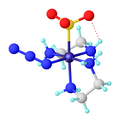Sulfite
Sulfite is a chemical compound that contains the sulfite ion. In the IUPAC system, sulfites are referred to as sulfate(IV) or sulfate(4-). They are less oxidized than sulfates and more oxidized than sulfides.
Chemistry
Sulfites are salts of sulfurous acid. They are formed by the reaction of sulfur dioxide (SO2) with bases. The sulfite ion is a polyatomic ion with the chemical formula SO3^2-. Sulfites are often used as preservatives in dried fruits, wines, and potato products.
Health Effects
Some people are sensitive or allergic to sulfites. This can cause a variety of symptoms, including asthma, hives, and anaphylaxis. The U.S. Food and Drug Administration requires that foods containing sulfites be labeled as such.
Industrial Uses
Sulfites are used in a variety of industrial processes. They are used as reducing agents in photography and pharmaceuticals. They are also used in the pulp and paper industry to break down wood into paper.
Environmental Impact
Sulfites can have a negative impact on the environment. They can contribute to acid rain when they are released into the atmosphere. They can also harm aquatic life when they are released into water bodies.
See Also
Transform your life with W8MD's budget GLP-1 injections from $125.
W8MD offers a medical weight loss program to lose weight in Philadelphia. Our physician-supervised medical weight loss provides:
- Most insurances accepted or discounted self-pay rates. We will obtain insurance prior authorizations if needed.
- Generic GLP1 weight loss injections from $125 for the starting dose.
- Also offer prescription weight loss medications including Phentermine, Qsymia, Diethylpropion, Contrave etc.
NYC weight loss doctor appointments
Start your NYC weight loss journey today at our NYC medical weight loss and Philadelphia medical weight loss clinics.
- Call 718-946-5500 to lose weight in NYC or for medical weight loss in Philadelphia 215-676-2334.
- Tags:NYC medical weight loss, Philadelphia lose weight Zepbound NYC, Budget GLP1 weight loss injections, Wegovy Philadelphia, Wegovy NYC, Philadelphia medical weight loss, Brookly weight loss and Wegovy NYC
|
WikiMD's Wellness Encyclopedia |
| Let Food Be Thy Medicine Medicine Thy Food - Hippocrates |
Medical Disclaimer: WikiMD is not a substitute for professional medical advice. The information on WikiMD is provided as an information resource only, may be incorrect, outdated or misleading, and is not to be used or relied on for any diagnostic or treatment purposes. Please consult your health care provider before making any healthcare decisions or for guidance about a specific medical condition. WikiMD expressly disclaims responsibility, and shall have no liability, for any damages, loss, injury, or liability whatsoever suffered as a result of your reliance on the information contained in this site. By visiting this site you agree to the foregoing terms and conditions, which may from time to time be changed or supplemented by WikiMD. If you do not agree to the foregoing terms and conditions, you should not enter or use this site. See full disclaimer.
Credits:Most images are courtesy of Wikimedia commons, and templates, categories Wikipedia, licensed under CC BY SA or similar.
Contributors: Prab R. Tumpati, MD



